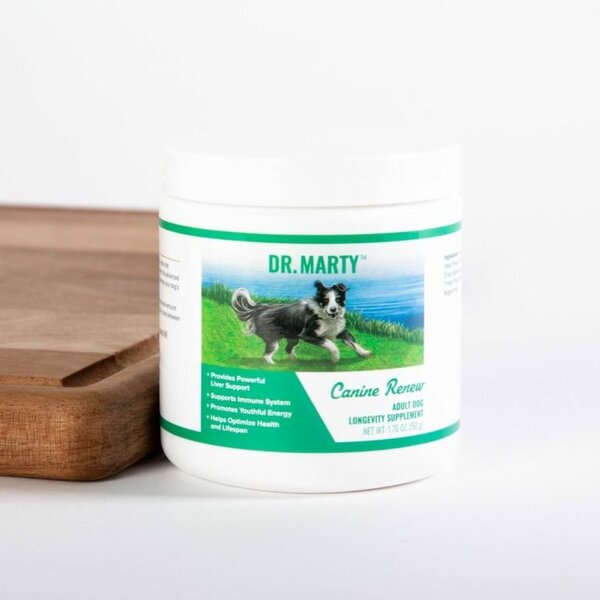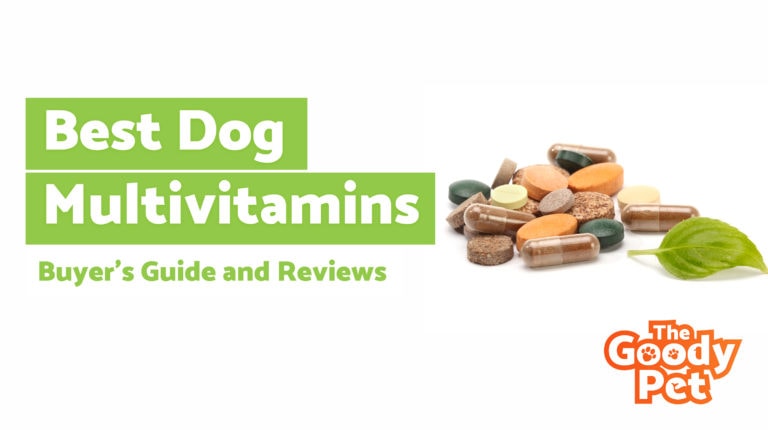The best dog multivitamin is Wholistic Pet Organics Canine Complete Multivitamins.
Dogs are said to be man’s best friend and have gained the distinction of being among the most popular pets. Just like human beings, dogs have dietary and nutritional requirements that need to be met.
Your pooches could develop vitamin deficiency if their diet is not well-balanced. That’s why we have curated a list of multivitamins that are specially formulated for your furry friend.
#1 Wholistic Pet Organics Canine Complete Multivitamins
If you have been looking for the best multivitamin supplement for the best health of your canine, then you just got one in this multivitamin. It’s an all-in-one supplement that contains vitamins, minerals, prebiotics, probiotics, fatty acids, and antioxidants to keep your pooch healthy.
What we really liked is that it’s made locally in the United States and certified by the NASC (National Animal Supplement Council).
This is a natural product that will provide your pooch with all its vitamin needs effectively. Made using natural whole-food ingredients, this multivitamin is an excellent all-around product for a healthy and strong canine.
Pros
- The Wholistic Pet multivitamin comes in powder form, which makes it easy to administer simply by mixing it in the pooch’s food or water.
- This canine multivitamin product is devoid of GMOs, synthetics, artificial flavoring, and filler ingredients that typically provide no nutritional benefit for dogs.
- Canine Complete multivitamins contain essential fatty acids, probiotics, and natural enzymes that all work together to promote a dog’s digestive health.
- Organic kelp, flaxseed, and fish protein powder ingredients included in this Wholistic Pet multivitamin product increase the powder’s palatability and ensure that dogs won’t turn their noses up at this multivitamin.
- This all-in-one powder formula is formulated for and suitable to use on dogs of all ages and sizes with essential vitamins, minerals, and antioxidants, providing the required nutrition.
Cons
- Wholistic Pet’s multivitamin powder has a smell that several dogs have reportedly found to be unappealing.
- Multiple dogs have reportedly developed gastrointestinal issues after consuming this multivitamin powder.
This is our recommendation for the top pick because its ingredients are sourced from highly digestible organic foods, providing the necessary nutrients for overall wellness, and the manufacturer has been HACCP and GMP certified since 2006.
#2 NaturVet 4-In-1 Dog Multivitamin
Most of the time, dog owners fail to get the right supplement for their furry friends as they can be expensive.
This multivitamin supplement beats that, and it’s a proven good source of essential vitamins and minerals for your canine. It is formulated by veterinarians and made locally in an FDA-audited, cGMP-compliant facility in the United States.
This all-in-one product is excellent for your dog’s vitamin needs and is also favorable to your budget. Did we also mention that it comes with a 100% money-back guarantee?
Pros
- NaturVet’s multivitamin product is formulated with special enzymes that maintain a pooch’s digestive tract and ensure the proper absorption of nutrients contained in this multivitamin.
- The omega-3, 6, and 9 fatty acids contained in this dog multivitamin ensure that the canine skin and coat remain in good condition and maintain a polished appearance at all times.
- The inclusion of glucosamine and chondroitin in this dog multivitamin product provides the nutrition that is needed for the formation of strong and healthy bones and joints in dogs.
- NaturVet’s multivitamins come in chewable capsules that are considered soft and easy for dogs to break down and swallow.
- NaturVet’s 4-in-1 dog multivitamin chews are manufactured in FDA and NASC-accredited facilities in the United States, with each product being subjected to routine tests to guarantee that the chews are safe for consumption by dogs.
Cons
- Several customers have reported that their dogs became sick with vomiting and diarrhea after eating NaturVet’s multivitamin chews.
- This product’s container doesn’t come with a seal to keep the chews fresh and safe for consumption after initially opening the jar.
#3 Zesty Paws Dog Multivitamins
This is a very great product for your beloved canine as it provides vitamins and minerals and helps to promote good digestive function, healthy joints, and a shiny coat. It contains glucosamine and chondroitin, which aid in maintaining the health of your pet.
The Zesty paws multivitamin for dogs is a great supplement that could help to promote a healthy immune system in your canine companion. With a chewable chicken flavor bite-sized tablet, you can give it as a treat to your pooch.
Pros
- This canine multivitamins product contains vitamin E, EPA, and DHA fatty acids gotten from fish oil, as well as B complex vitamins to provide the nutrition and moisture needed to ensure that a pooch’s skin and coat maintain a polished appearance.
- Zesty Paws’ dog multivitamins feature a combination of OptiMSM, chondroitin, glucosamine, and cod liver fish oil that all work together to strengthen the canine hips and joints and improve dog mobility.
- The special probiotic and gut health blend contained in this Zesty Paws product is useful for quickly resolving cases of gastrointestinal distress in dogs.
- This dog multivitamin product contains vitamins C and E, both of which are good sources of antioxidants that provide free radical support for the canine immune system.
- Zesty Paws’ multivitamins are packaged in a resealable jar to preserve the chews’ freshness and ensure that their safety isn’t compromised by external contaminants.
Cons
- A significant amount of ingredients is used to manufacture this canine multivitamin, thereby making this product not perfectly suitable for dogs with sensitive stomachs and food allergies.
- Several dogs reportedly do not like the flavor of the Zesty Paws multivitamins, and as a result, they refuse to eat the chews.
#4 PetHonesty 10-In-1 Dog Multivitamins
If you are looking for a single product with multiple benefits, then your search has come to an end. The 10-in-1 dog multivitamin supplement with glucosamine will provide your canine with a lot of benefits to improve its well-being.
With 1 Billion CFU Probiotics, it helps to improve your dog’s digestive system.
This is an excellent product for your pet pooch owing to its multiple benefits, especially its inflammatory properties that boost the immunity of your furry friend.
Pros
- These natural supplements contain a considerable amount of glucosamine per chew to provide dogs with the building blocks needed for the formation of strong bones and joints.
- PetHonesty’s multivitamins reportedly contain over a billion colony-forming probiotics per serving, as well as natural sources of fiber like pumpkin to promote canine digestive health.
- Omega fatty acids obtained from the eggshell meal and krill oil contained in this dog multivitamin increase canine coat shine and are also useful for treating cases of skin irritation in dogs.
- PetHonesty multivitamins contain vitamins A, C, and D3 that boast antioxidant and anti-inflammatory properties that provide support for the canine immune system.
- This dog multivitamin product is produced without GMOs, wheat, corn, and soy to prevent adverse reactions by consumer dogs with allergies to these ingredients.
Cons
- Not all dogs find the flavor of PetHonesty’s multivitamins to be palatable.
- Consumption of these multivitamins has reportedly triggered diarrhea in multiple dogs.
#5 Pet MD Advanced Multivitamins For Dogs
This is a nice product for your pooch to satisfy its needs for vitamins and minerals. It comes in the form of chewable tablets.
In one bottle, there are 365 tablets. One for each day of the year. This means that a daily dose supply is enough to last your canine companion for a full year. It is made locally in the United States using a Federally Regulated Manufacturing Facility.
This supplement is good for your canine’s nutritional needs regardless of its age. We really liked that the manufacturers have tested this product to be safe from E-Coli, Salmonella, Staphylococcus Aureus, Coliforms, Yeast, mold, and More.
Pros
- PetMD’s Advanced multivitamins feature synergistically-combined vitamins, minerals and antioxidants that all work together to ensure that all systems in a pooch’s body remain in good health.
- Protein provided by PetMD’s Advanced multivitamins provide the nutrition needed to give a pooch’s coat a polished look at all times.
- This product’s 365 daily use tablets, which can either be given as chewable treats or crumbled directly in a pooch’s food, can last for a significant period.
- This advanced multivitamin product from PetMD is formulated and suitable for use by dogs of all breeds, ages and activity levels.
- This canine multivitamin product is manufactured in an FDA, USDA and FSIS-regulated facility located in the United States.
Cons
- Customers claim that this product’s dosage is misleading as, rather than the 1 tablet per day that is advertised, the instruction guide shows that their pooches have to use multiple tablets per day.
- Several dogs reportedly don’t like the liver flavor of this advanced multivitamin product.
#6 Nutri-Vet Multi-Vite Chewables For Dogs
It’s a known fact that some supplements may prove to be hard for your pooch to take. That’s why if you are feeding your canine friend supplements directly, it’s best to choose one that comes in great taste.
From our research, dog parents really liked the Nutria-Vet Multi-Vite Chewables because it’s great tasting for their pooches.
Pros
- Nutri-Vet’s multivitamins contain vitamin D that ensures the proper breakdown and absorption of other nutrients, such as calcium and phosphorus, into the dog’s bloodstream.
- Vitamin C contained in the Multi-Vite chewables provide support for a dog’s nervous system and also ensure optimal brain function.
- Nutri-Vet chewables contain essential fatty acids that help maintain dog skin and coat health.
- The vitamins and minerals in this Nutri-Vet product provide sufficient nutrients to cater to any deficiency in a pooch’s normal diet.
- This multivitamin product is manufactured in facilities located in the United States, with ingredients gotten from reputable sources worldwide.
Cons
- Not all dogs like the Multi-Vite’s liver flavor, as several dogs have been reported to have refused to chew the tablets.
- Some dogs have developed an upset stomach after taking the Multi-Vite chewables.
#7 WetNozeHealth Dog Vitamins
This product is a nice blend of ingredients for your canine’s health. The multivitamin supplement has turmeric and chicken flavor that goes out of its way to improve its overall taste.
It is also soft – suitable for chewing by your pet pooch, making it easy to ingest.
This is an excellent multivitamin product with additional benefits to help promote skin integrity and joint strength.
Pros
- The WetNozeHealth multivitamins contain five different probiotic strains, with approximately two billion colony-forming units (CFUs), to provide dogs with relief from diarrhea and constipation, as well as reducing gas buildup and bloat.
- Organic turmeric and yucca contained in this dog vitamin product both have powerful anti-inflammatory properties and act as a natural pain relief for dogs.
- Several customers have reported a marked improvement in their canine buddies’ skin and coat quality after consistently using this WetNozeHealth product.
- This product contains essential minerals that provide additional support for a dog’s joints and bones.
- Customers can administer this product by either serving the multivitamin to their dogs as a tasty treat, breaking down the tablet into a bowl for their pooches to eat, or mixing with their pooch’s meals.
Cons
- Multiple customers claim to have received WetNozeHealth packages with the multivitamin tablets clumped together and needing to be broken apart before use.
- Some dogs have also developed allergic reactions to some of the ingredients contained in this multivitamin product.
#8 Pet-Tabs Original Formula Vitamin Supplement
This is a great vitamin supplement that comes in the form of tasty chewable tablets that your pooch will love. The tabs contain ample vitamins and minerals, as well as other essential ingredients that are important for your canine’s health.
The vitamin supplement provides essential vitamins and minerals along with minerals for your dog’s food. The tables are easy to administer and can be given as a treat.
Pros
- The Pet-Tabs supplements come in easy-to-administer tablets that can either be chewed directly by a pooch or mixed into the dog’s food.
- This dog multivitamin product contains a considerable amount of vitamins and minerals, including calcium, phosphorus, and vitamins A, B6, B12, and D3, that contribute to a pooch’s welfare in various capacities.
- The fatty acids and vitamins contained in this supplement are good for treating hair loss in dogs and maintaining the luster of the canine coat.
- Pet-Tabs’ original formula is available in two different packages – 180 and 365 counts – to accommodate customers’ budgets, cater to a dog’s needs, and reduce wastage.
- The fact that these supplements are manufactured and packaged in the United States, to ensure quality control, is another plus for the Pet-Tabs brand.
Cons
- These multivitamins reportedly expire and become unsafe for canine use in less than a year after purchase.
- This Pet-Tabs formula contains sugar, which has been proven to be unsafe for canine consumption.
#9 Buddy & Lola Multivitamin Dog Chews
The Buddy & Lola Multivitamin helps to support the immune system of your dog with its formulated vitamin A, C & E.
It also contains calcium and magnesium which are essential for the overall good health of your pet. Similar to most canine multivitamins, it comes in soft chew for your dog’s easier consumption.
Buddy & Lola Multivitamin Chews for Dog is an excellent supplement that will also provide additional minerals along with vitamins. It’s on the pricier side, and there are cheaper alternatives in the market which provide the same multivitamin content.
Pros
- Buddy & Lola’s dog chews contain vitamins A, C, and E that possess antioxidant properties that are essential for the protection of the canine immune system from free radical damage.
- Magnesium and calcium contained in these dog chews can provide the building blocks for the development of strong and healthy teeth and bones in pooches.
- This multivitamin dog chew product provides up to 21 essential nutrients that promote the general physical well-being of dogs of all ages, breeds, and sizes.
- Buddy & Lola’s multivitamin chews are prepared without corn, wheat, and other artificial ingredients that typically trigger food sensitivities and allergies in dogs.
- Each canine chew of this multivitamin product contains essential fatty acids that provide the moisture needed to keep a dog’s coat shiny at all times.
Cons
- Several dogs with histories of food pickiness have reportedly refused to eat these multivitamin chews.
- The texture of Buddy & Lola’s chews is reportedly too hard for some pooches to comfortably break down and swallow.
#10 MOKAI 10 In 1 MULTIVITAMIN For Dogs
MOKAI is committed to providing high-quality products for every pet across the globe. This Daily Multifunction multivitamin from MOKAI is a great tasty treat made from natural ingredients.
The product has been specially formulated with various vitamins, minerals, and other antioxidants to further improve the digestion and appetite of your furry friend, as well as to maintain bone strength and joint health.
Dogs of all ages can use this multivitamin. It improves life quality and helps to promote healthier skin and coats.
Pros
- This canine multivitamin product contains glucosamine and chondroitin for forming stronger bones and joints, as well as the strengthening and maintenance of the existing skeletal system.
- The inclusion of digestive enzymes and probiotics in this canine multivitamin formula promotes healthy metabolism and digestion while also aiding a dog in fighting existing stomach infections.
- Adaptogens and superfood ingredients, such as reishi and wheatgrass, contained in this dog multivitamin provide high levels of several health-supporting nutrients needed to keep a pooch in optimal physical shape.
- These multi-functional dog treats are manufactured in the United States, with a plant-based ingredient list and plastic-free packaging, ensuring that the chews are safe for dogs to consume.
- The dog fish oil supplements contained in this daily multivitamin product for dogs release fatty oils needed to improve canine skin and coat conditioning.
Cons
- These chews have a flavor that several dogs have reportedly found unappealing, thereby resulting in such pooches refusing to eat the multivitamins.
- The chews are considerably hard and difficult to cleanly break in half when administering the recommended dosage to small dogs.
#11 Rx Vitamins Essentials 8oz/226.8g Powder For Dogs
This is a great supplement for a young pup as it contains a rich amount of vitamins and minerals to support a healthy immune system and calcium that will promote good bone health.
It also contains protein and iron extracts which make it an all-around supplement for your pet.
This is a versatile supplement that will provide a range of nutrients for the well-being of your pooch. Served in a powdered form, you can mix this multivitamin with your dog’s daily diet.
Pros
- Rx’s Essentials powder is formulated with spirulina, which serves the dual purpose of boosting a dog’s immune system and supporting its digestive system.
- The powder form of this Rx multivitamin can be easily mixed into and administered with both wet and dry dog food or sprinkled directly into the pooch’s drinking water.
- Calcium citrate contained in this Rx multivitamin powder facilitates proper bone development in dogs, as well as ensuring proper muscle building and functioning.
- This dog multivitamin contains maltodextrin, which is a rich source of carbohydrates to ensure the release of sufficient energy for a dog to go about its daily activities with ease.
- This canine multivitamin also contains milk thistle, which is a safe herb with a history of effectiveness in treating and managing liver problems in dogs.
Cons
- The powder tends to get clumpy and difficult to administer with time.
- Several customers claim to have received Rx containers that were only half full with the multivitamin powder.
#12 Nupro Nutri-Pet All-Natural Supplement For Dogs
This supplement is made from all-natural products. It contains no artificial additives that can be potentially harmful to your furry friend.
Apart from that, it promises a flea-repellent property, which we found to be an unverified claim.
It is an entirely natural canine supplement and doesn’t contain any wheat or corn.
Pros
- Nupro’s all-natural supplement doesn’t contain wheat, corn or other ingredients that typically trigger allergies and food sensitivities in dogs.
- This canine supplement contains omega fatty acids that help correct dry and flaky skin in dogs and also promotes hair growth in pooches dealing with hair loss.
- This product has a great price point, considering the relatively large size of the container and the quantity of multivitamin powder that is provided.
- Customers can conveniently administer this supplement powder by mixing it in either their pooches’ food or drinking water.
- The Nupro Nutri-Pet product is available in four different sizes – 1lb, 5lbs, 30oz, and 60oz – to suit each dog’s individual needs.
Cons
- Regarding the amounts of the active and inactive ingredients used in manufacturing this all-natural supplement for dogs, there is little or no information for verification purposes.
- According to customer reports, this supplement has a strong flavor and scent that tends to turn off a considerable amount of dogs.
#13 Milk-Bone Good Morning Daily Vitamin Dog Treats
Made without any artificial flavorings or preservatives, the Milk-Bone Vitamin Dog Treats help support your dog’s immune system. It comes in the form of chicken-flavored regular treats, which are loved by pooches.
Made without any artificial flavorings, it helps to promote healthier joints and supports your dog’s overall well-being.
Pros
- Milk-Bone’s Good Morning treats are manufactured with chicken as the major ingredient to provide the protein nutrition that is needed to facilitate proper canine growth and development.
- This multivitamin formula supports the formation of healthy bones and joints due to the inclusion of glucosamine and chondroitin among its ingredients.
- Vitamin C and other antioxidants contained in the Milk-Bone treats provide the canine immune system with the support needed to resist damage from free radicals.
- The inclusion of fiber among the ingredients used to make Milk-Bone multivitamins facilitates the growth of beneficial bacteria in a pooch’s gut, thus ensuring smoother digestive processes.
- The brain and mental health of consumer dogs will benefit massively from the inclusion of DHA in the Milk-Bone multivitamin recipe.
Cons
- There are concerns over this product’s quality control, as several customers have received spoiled multivitamin packages containing foreign bodies, such as mold, maggots, and grain mites.
- The Milk-Bone treats are reportedly too hard and big for toy and small-sized dogs to chew.
#14 ProSense Dog Multivitamin
The ProSense multivitamin is a chewable tab supplement that is suitable for dogs of all ages. This supplement helps to support the overall wellness of your furry friend.
It is an inexpensive option that helps to support the overall wellness of your dog.
Pros
- This canine multivitamin product is formulated for and can be used by dogs of all breeds that are at different stages of life – puppy, adult, and senior.
- The ProSense multivitamins contain a host of vitamins that carry out a host of actions, ranging from immune system support to energy release, in a dog’s body.
- ProSense’s dog multivitamins feature a quality seal from the National Animal Supplement Council as a sign of safety and effectiveness for dogs.
- Each pack of the ProSense multivitamin product contains 90 chewable tablets that can last for a considerable period when used as recommended.
- The ProSense chewable tablets are formulated with brewer’s yeast to make them more palatable and appealing to dogs.
Cons
- The ProSense tablets are considerably hard and difficult to break in half – for smaller dogs – unless using a knife or any other cutting tool.
- Several customers have commented that their dogs became sick with diarrhea after using these multivitamin tablets.
#15 Nutramax Cosequin DS Plus Chewable Tablets With MSM
This is a nice multivitamin for your canine that comes with additional minerals that help to support bone and joint strength.
The Nutramax Cosequin supplement is a suitable multivitamin to help support the mobility functions of your furry companion. It contains MSM (Methylsulfonylmethane), which helps to provide good joint and bone health.
Pros
- Nutramax Cosequin is formulated with MSM, which is an anti-inflammatory compound that is useful for treating bone disorders in dogs.
- This Nutramax multivitamin product is manufactured in the United States with ingredients sourced globally from renowned and trusted suppliers.
- This canine multivitamin product contains glucosamine and chondroitin that provide bone and joint support by helping to protect existing cartilage from breaking down, in addition to supporting the formation of strong cartilage.
- The chewable Nutramax tablets can equally be broken down and crushed into a dog’s food for easier administration and convenience.
- This product comes with clear and concise dosage instructions to ensure that effective amounts of the multivitamins are administered to dogs.
Cons
- There are multiple reports of these multivitamins inducing diarrhea and vomiting in dogs after consumption.
- Several dogs, reportedly, don’t like the texture and flavor of the Nutramax chewable tablets.
Dog Multivitamins Buyer’s Guide
We have listed a few multivitamins that make your pooch look great in their appearance and promote general health.
But does your furry friend need these multivitamins?
And what factors should you consider while buying multivitamins?
By the end of this section, you will have answers to these questions. So, let’s get started.
Does Your Dog Need Multivitamins?
It is a well-known observation that many modern dogs are suffering from various health problems which were not common in canines earlier.
You may ask yourself why that is so. The rise of processed food is replacing the fresh food diet that dogs are accustomed to having in the wild.
Most of these health problems are associated with the processed foods your pooches are consuming nowadays. However, it is hard to avoid giving them this diet because of its availability. The hard truth about the whole scenario is the increasing incidences of dental problems, dog cancers, allergies, obesity, and many diseases.
A dog in the wild is used to a raw diet – herbs, fruits, grass, meat, bones, and skin of their prey. That means they get a well-balanced meal. You must ensure your canine friend has a balanced diet too. And a non-balanced diet means your pooch might have a vitamin deficiency.
As dog owners, we truly care for our furry friends and will make sure that they are given the best diet which we can afford. However, there are still times when they need a specific vitamin for their growth. For example, when recovering from medical conditions such as diseases, surgical procedures, and pregnancies, they do need a higher dose of multivitamins.
What should you look at before purchasing a multivitamin?

Choose Your Multivitamin Carefully
Your canine companion may need a little boost, especially when they are not in their best of health.
Multivitamins can help to supplement your dog’s diet and provide nutritional benefits. It is always advisable to consult your local veterinarian prior to giving your pooch any form of supplements. Your veterinarian will be the best person to provide any medical opinions for your dog.
If your dog has a specific vitamin deficiency, then your veterinarian should be able to advise you on the vitamins and minerals to look for. Besides, if your pooch is currently on any other medication, your veterinarian should recommend a supplement that will not react negatively to the medication.
Check The Expiry Date – Just as you check the expiry date of your food products, ensure you don’t skip this check when purchasing the multivitamins. An expiry supplement could cause negative side effects such as vomiting, abdominal pains, constipation, diarrhea, or even mortality.
Read The Labels Carefully – This will help you to understand the ingredients that are used in the product. Check if there are additives and artificial colorings that can cause harm to your dog.
Check The Lot Number – Some labels have great ingredients, but that’s not the actual ingredients. That’s why you need to check the lot number. It tells you that the company did quality checks on the product.
Read Actual Reviews Of Customers – Especially if you are doing online shopping, be sure to check their customer reviews. These customers will mention their experiences with the product and how effective the product was.
Clinical & Laboratory Studies – As a general guideline, look out for a supplement that has successful clinical results from their laboratory studies. Your veterinarian should be able to help you out.
Avoid Out-Of-The-World Promises – Multivitamins are not meant to cure diseases. Instead, multivitamins support healing. Avoid multivitamins that provide “too good to be true” claims.
Vitamin E Complex – They are natural antioxidants that are good for your dog’s immune system.
Avoid Calcium & Iron – These two compounds may hinder proper absorption. If your dog needs the two minerals, buy two separate multivitamins instead.

Factors To Consider When Buying Multivitamins
Before purchasing any type of multivitamins, you need to think about these dog-related factors.
Age Of Dogs
Dogs usually require different amounts of vitamins and minerals depending on their age. If your puppy is not on a well-balanced diet, then it might need more vitamins. Inversely, an older adult pooch will need a higher amount of supplements to boost their immunity because they are not as healthy anymore.
How Much Does It Cost?
We must emphasize that multivitamins are for supplementing the food you are feeding your dog. So, you don’t have to spend thousands of dollars to buy a single supplement unless it is unavoidable. Always do a price/feature comparison to make sure that you are getting the best supplement at a reasonable price point.
Types Of Ingredients Used
You should avoid multivitamins with fillers, additives, synthetic colorings, or any other ingredients that seem dubious.
Some unethical manufacturers might include these filler ingredients to extend the shelf life of their product, which might not be that healthy for your furry friend.
It is also advisable to look out for multivitamins whose nutrients have been activated. Nutrients in their active form tend to be absorbed faster into the bloodstream, hence boosting the effectiveness of multivitamins.
Is Your Dog Active?
Some breeds of dogs are great runners and swimmers, while others just like sleeping. Depending on the activity level of your furry friend, you might need to tweak the dosage of the multivitamins.
Dogs that are more active in nature could have greater tendencies to develop joint conditions. Therefore, it is important to choose the right multivitamin that matches the lifestyle that your furry friend has.

Your Dog’s Weight
The weight of your dog is an important factor that you should consider before purchasing multivitamins. It affects metabolism, and most multivitamins in the market have certain weight limits to ensure effectiveness.
Your dog’s weight determines the type of multivitamins, the frequency with which they can be taken, and also, the dosage.
For this factor, we highly recommend consulting with a qualified veterinarian first.
Your Dog’s Existing Medication
There are some medications that can interact dangerously with the multivitamins that your pooch consumes. You need to check the ingredients and consult your veterinary doctor for more information.
It’s for the safety and well-being of your canine companion.
Mode Of Consumption
The mode of consumption of multivitamins is another key factor that you should consider. Multivitamins generally come in various methods of consumption, such as capsules, tablets, suspensions, and injections.
Injections are easy to administer. However, it may prove to be an inconvenient method if your dog is highly temperamental and will not stay still at the sight of a needle.
Capsules and tablets are common methods of consumption. But if they taste bad, your pooch may refuse to eat them in the future. A trick is to mix the capsules and tablets together with its meal so that the taste is masked.
Final Thoughts
Prevention Is Better Than Cure!
Never give your furry friend your “human” vitamins, as they can be unsafe for canine consumption. Instead, consider an option from our list of recommended multivitamins. These multivitamins are formulated especially for canines and have been used by dog owners all over the United States.
We recommend our top pick because of its all-in-one trait. With just one single multivitamin, your pooch will be able to get its dose of vitamins, minerals, fatty acids, and powerful antioxidants. Besides, it is naturally made without any additives or artificial ingredients.
Grab yours today, and keep your pooch healthy!





